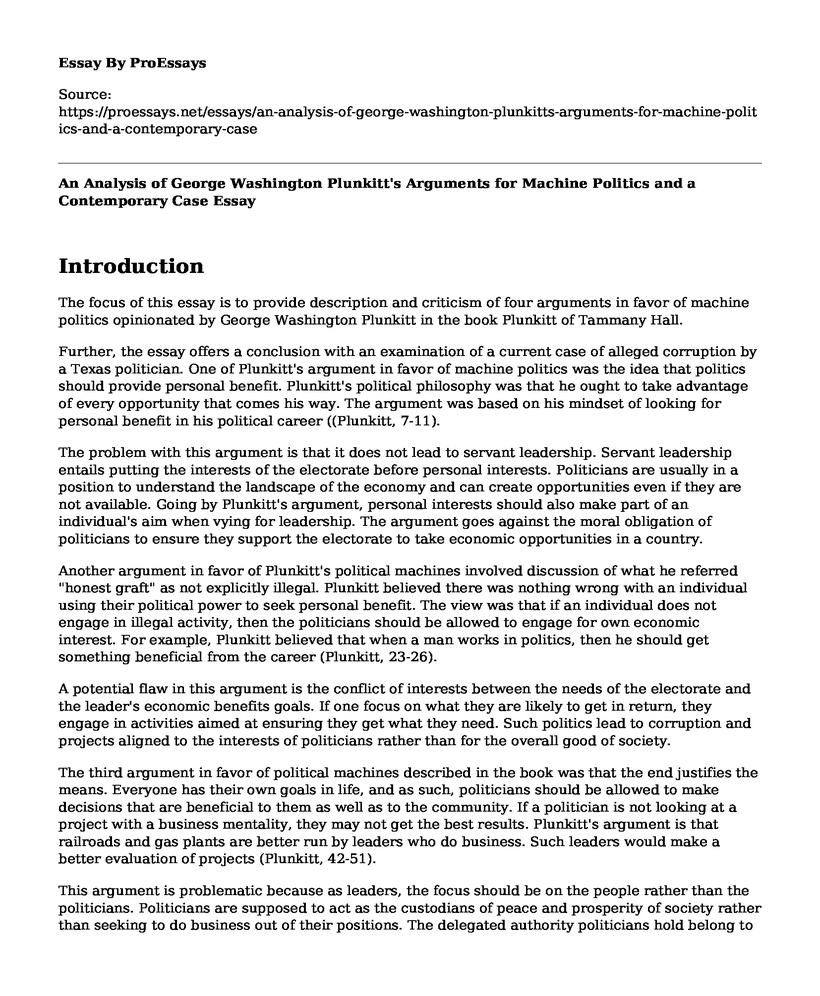Introduction
The focus of this essay is to provide description and criticism of four arguments in favor of machine politics opinionated by George Washington Plunkitt in the book Plunkitt of Tammany Hall.
Further, the essay offers a conclusion with an examination of a current case of alleged corruption by a Texas politician. One of Plunkitt's argument in favor of machine politics was the idea that politics should provide personal benefit. Plunkitt's political philosophy was that he ought to take advantage of every opportunity that comes his way. The argument was based on his mindset of looking for personal benefit in his political career ((Plunkitt, 7-11).
The problem with this argument is that it does not lead to servant leadership. Servant leadership entails putting the interests of the electorate before personal interests. Politicians are usually in a position to understand the landscape of the economy and can create opportunities even if they are not available. Going by Plunkitt's argument, personal interests should also make part of an individual's aim when vying for leadership. The argument goes against the moral obligation of politicians to ensure they support the electorate to take economic opportunities in a country.
Another argument in favor of Plunkitt's political machines involved discussion of what he referred "honest graft" as not explicitly illegal. Plunkitt believed there was nothing wrong with an individual using their political power to seek personal benefit. The view was that if an individual does not engage in illegal activity, then the politicians should be allowed to engage for own economic interest. For example, Plunkitt believed that when a man works in politics, then he should get something beneficial from the career (Plunkitt, 23-26).
A potential flaw in this argument is the conflict of interests between the needs of the electorate and the leader's economic benefits goals. If one focus on what they are likely to get in return, they engage in activities aimed at ensuring they get what they need. Such politics lead to corruption and projects aligned to the interests of politicians rather than for the overall good of society.
The third argument in favor of political machines described in the book was that the end justifies the means. Everyone has their own goals in life, and as such, politicians should be allowed to make decisions that are beneficial to them as well as to the community. If a politician is not looking at a project with a business mentality, they may not get the best results. Plunkitt's argument is that railroads and gas plants are better run by leaders who do business. Such leaders would make a better evaluation of projects (Plunkitt, 42-51).
This argument is problematic because as leaders, the focus should be on the people rather than the politicians. Politicians are supposed to act as the custodians of peace and prosperity of society rather than seeking to do business out of their positions. The delegated authority politicians hold belong to the people, and, thus, taking advantage of their views for commercial benefits is not right.
Finally, Plunkitt suggested that political machines were beneficial because they resulted in an overall good to society. Plunkitt believed that since his actions were not done from an inclination or fear, he extended his self-interests to serve the community for mutual benefit (Plunkitt, 78-81). His support for the party supporters was done out of patriotism and repaying those who supported him in elections. The political machines ideology is based on the idea that politicians should act because of duty but not the inclination.
One could counter this argument by pointing out that "goodwill" leadership does not come from a call for duty but rather from inherent desire to do the right actions in society. If politicians are bound by the task, then it would be inappropriately dispensed. The bureaucratic system that such ideology would propagate only serves limited benefits in society. Not all decisions based on political machines ideologies benefit community or lead to general good to the people.
Conclusion
Turning to the present day, it is interesting to speculate how Plunkitt would feel about recent convictions of former Dallas councilwoman Carolyn Davis to bribery conspiracy. Davis received checks and cash from Hamilton to support an affordable housing development headed by Hamilton (Haaf, Trahan and Eiserer). I believe Plunkit would think that since Davis did not do anything illegal, she was justified to receive the benefits. According to the ideologies of Plunkitt, politicians should get something in return for their position of power. Further, the authority held by the politician should be used when an opportunity presents itself. As such, Davis was bound to take advantage of her position to support the business venture that would later benefit her financially. In my view, Davis ought to be penalized as her self-interests goes against the general good of society. Davis's support for Hamilton's housing project led to corruption and decisions based on what the leader was getting. When politicians act as machines without any consideration of political morality, they end up making decisions that are centered on self.
Works Cited
Haaf, Landon, Jason Trahan and Tanya Eiserer. Former Dallas councilwoman Carolyn Davis pleads guilty to accepting $40K in bribery conspiracy. 1 March 2019. Web. 15 September 2019.
Plunkitt, George. Plunkitt of Tammany Hall. Scotts Valley: CreateSpace Independent Publishing Platform, 2018. Print.
Cite this page
An Analysis of George Washington Plunkitt's Arguments for Machine Politics and a Contemporary Case. (2023, Feb 15). Retrieved from https://proessays.net/essays/an-analysis-of-george-washington-plunkitts-arguments-for-machine-politics-and-a-contemporary-case
If you are the original author of this essay and no longer wish to have it published on the ProEssays website, please click below to request its removal:
- Paper Example on Nuclear Weapons Should be Eliminated
- Landlord and Tenant Board Essay Example
- HR 4173 Paper Example
- Stalin's Policies Paper Example
- Communism, Capitalism, and Socialism Essay
- Global Governance: Current Debate & Future Prospects - Research Paper
- Paper Example on Abolish Electoral College: Inefficient & Unjust







